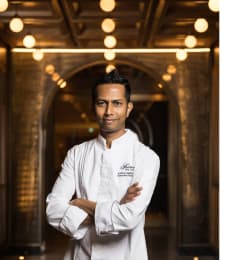CHEF Claire Heitzler
Early on in her career, Heitzler learned to work with quality, seasonal ingredients. “I started out with the three-Michelin-star restaurant, Troisgros, which is a restaurant where they cultivated the raw materials, and the produce was delivered directly to the pastry chefs,” she said. “I then went to Alain Ducasse … We were always searching for new ingredients to bring to the tables.” Heitzler credits Ducasse with instilling in her the importance of understanding where her ingredients came from. “He really helped me to grow to this level,” she said. “He fights for the naturalness of fruits and vegetables … When I was working for him, I couldn’t present a dessert to him without knowing exactly from where each ingredient came.”
But using thoughtfully sourced ingredients wasn’t enough for Heitzler. She also wanted to visit the farmers, to get to know them and build relationships with them. This desire to get closer to the ingredients and their producers led her to join Valrhona for a visit to one of their cocoa plantations in the Bahia region of Brazil. She was pleasantly surprised to find that Valrhona worked very closely with their planters – something that didn’t exist between chefs and farmers in France. “With Valrhona, we’ve had a very special and privileged relationship,” she said. “Through Valrhona, we’ve gotten to know their planters and producers one-on-one. When I was in Brazil, I noticed that ethics are always present in Valrhona’s dealings with producers.” Heitzler’s experience visiting the plantation moved her to build a partnership with Valrhona.
Throughout 2019, Chef Heitzler collaborated with L’École Valrhona to bring the chefs from the pastry school to visit the farms that produce raw ingredients, such as citrus, flour and berries, so they could understand what goes into the farmers’ work and the challenges they manage. The chefs also had the opportunity to learn about the biodiversity they have in France. When we went to go see the citrus farmers, we had at least 20 different [varieties of citrus], so it’s up to us to decide which citrus flavors we’d like to use in our recipes,” said Heitzler. To document this initiative, she and the L’École Valrhona chefs created a book called the Reflective Pastry Chef’s Guide to Ethical Pastry Making. “It covers everything that we’ve discovered through the farmers and going to visit the producers, and you’ll see to what extent the chefs were inspired by the growers and the farmers. It’s really moving what they’ve written and what they discovered during all of the visits.”
According to Chef Heitzler, culinary professionals have a special responsibility to use ingredients that are in season and to vet the quality of their ingredients. “There are a lot of small producers that do a lot of great organic things that we need to know more about,” she said. “If we want to make sure that these producers stay alive and keep doing their craft in ten years, it’s today that we have to be active. As professionals in gastronomy, we have a role in this.”
Because of her longstanding relationships with farmers and planters, Heitzler is no stranger to how climate change is affecting the quality and growing seasons of our produce. “I think that the soil, the land, is really crying out for help,” she said. “I think that we, the professionals, can really help. I’m convinced about that. We can do this by giving our clients seasonal fruits and vegetables. For example, a strawberry that we eat in the winter absolutely does not have the same taste as a strawberry we eat in the summer, and our clients know that. If we get into the habit of only eating great strawberries that are grown in the middle of summer, we won’t want to go back to eating strawberries that are grown in the middle of winter.”
Heitzler’s advice to other chefs who are looking to incorporate seasonality and ethical sourcing practices into their work is simple – reconnect with the land. “We forget that nature is the raw materials,” she said. “That’s where they come from, so we really need to reconnect to the Earth."
About Chef Claire Heitzler:
Claire Heitzler began her pastry training with Thierry Mulhaupt in Strasbourg, before going on to join such prestigious establishments as the Troisgros, Georges Blanc and Jean-Paul Abadie restaurants. In 2003, Claire became a pastry chef at L’Oranger in London, before moving on to open Alain Ducasse’s restaurant Beige in Tokyo and later becoming the Executive Pastry Chef at Park Hyatt in Dubai. After being appointed pastry chef at the Lasserre restaurant, she became creative director
of Ladurée in 2016. Chef Heitzler draws inspiration from nature and is driven by her desire for exploration and curiosity. Chef Heitzler will share her nature-driven approach and her passion for using quality, locally sourced products from farmers who practice sustainable agriculture. Her life experiences and inspirations translate into elegant and refined plated desserts and petits gâteaux, earning her international recognition and acclaim.



